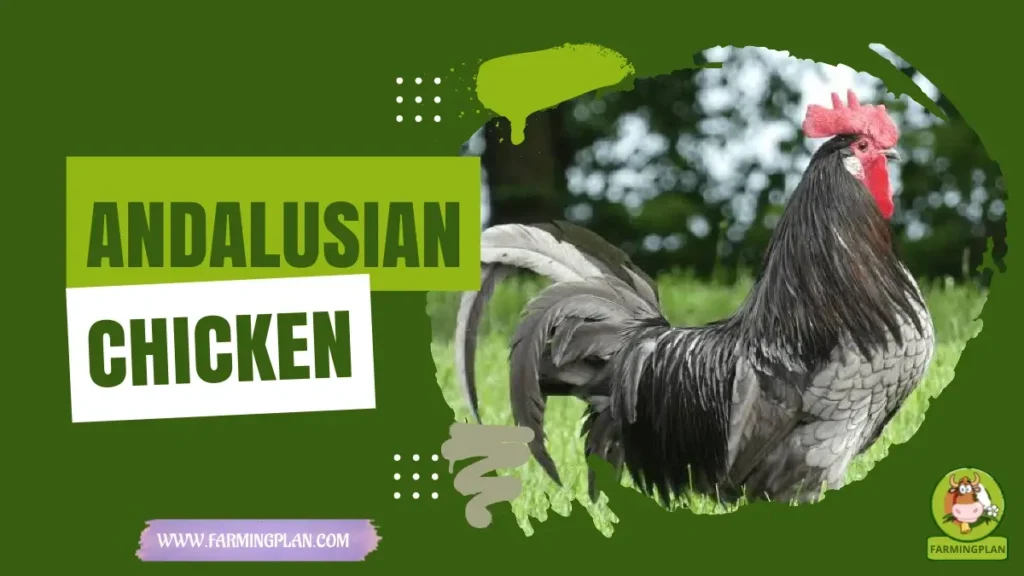The Frizzle Chicken is one of the most eye-catching birds you’ll ever see in a backyard flock. With its wild, curly feathers and cheerful personality, this frizzled bird often looks like it just walked out of a cartoon! It’s no surprise that more and more backyard chicken keepers and pet owners are falling in love with this unique chicken breed. From its wild feathering to its calm and friendly nature, the Frizzle Chicken is a fun and gentle companion for families, farmers, and hobbyists. This striking bird isn’t just about looks. Frizzle chickens also lay many eggs and get along well with other calm birds.
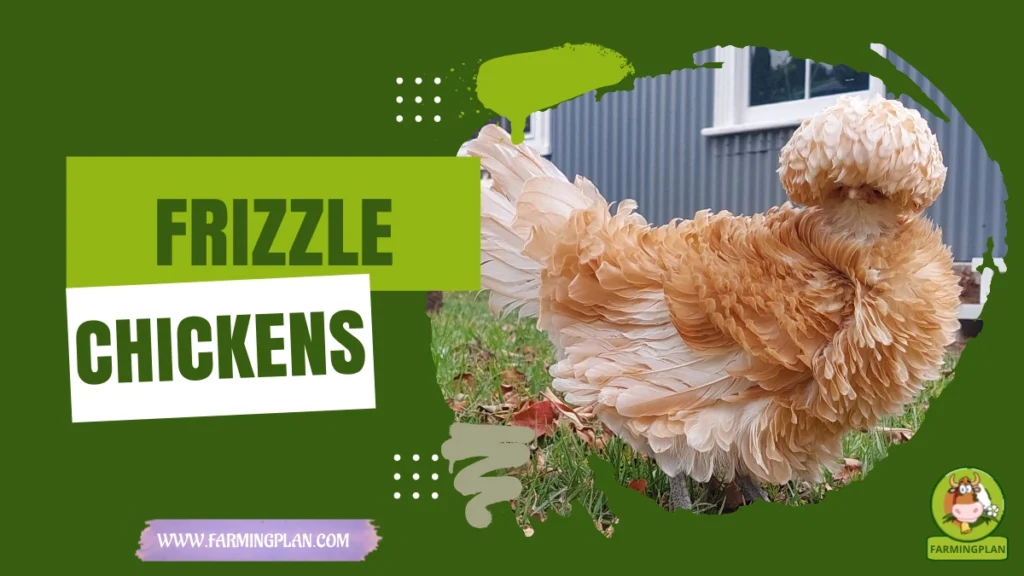
History and Origin of Frizzle Chickens
The Frizzle Chicken has a long and fascinating past. This curly-feathered bird has been around since at least the eighteenth century. Many experts believe the frizzling gene first appeared in Asia, most likely in countries like India or the Philippines. These early birds were then brought to Europe through trade. By the mid-1700s, frizzled chickens began appearing in poultry exhibitions across Europe. People were amazed by their fluffy, curled feathers and distinctive appearance.
Back then, these birds weren’t seen as a distinct breed. Instead, they were considered a feather type. That means the frizzle look could show up in many different chicken breeds. Over time, through selective breeding, farmers and poultry enthusiasts created lines that kept this trait more often. Today, the frizzle chicken breed is known for its unique look, even though some still debate whether it’s an actual breed or a feather style.
The Frizzle Chicken made its way to North America in the 20th century. American breeders loved their wild style and friendly nature. Today, you can find Frizzles in backyards and chicken competitions worldwide. Some are even shown under specific breed types like Frizzled Polish or Cochin. Whether you raise them for fun or shows, these birds always bring smiles with their wild curls and gentle personalities.
Reads More: Austrian Pinscher Dog: 7 Incredible Benefits You Need to Know
Characteristics of the Frizzle Chicken
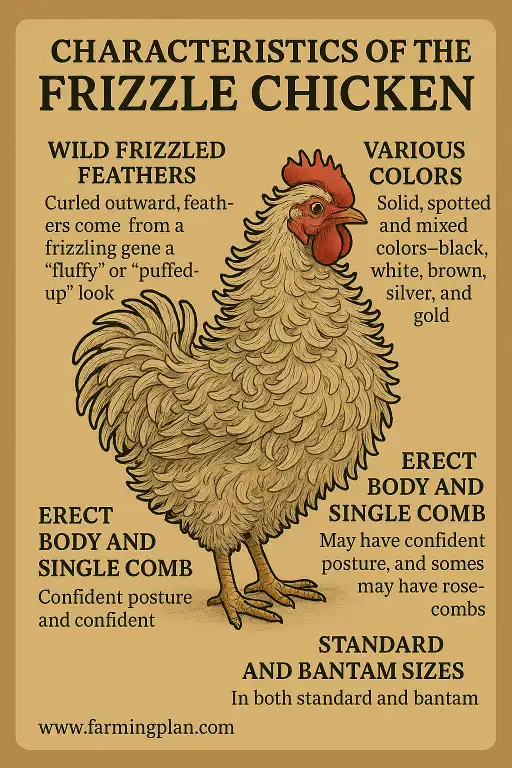
The Frizzle Chicken is known for one thing above all—its wild, frizzled feathers. These feathers curl outward instead of lying flat like those on a smooth-feathered bird, giving the Frizzle its “fluffy” or “puffed-up” look. This nifty feature comes from a dominant gene called the frizzling gene. It affects how the feathers grow and gives the bird its crazy, eye-catching style.
Frizzle Chickens come in various colors, from solid black to soft white, and even spotted mixes. Some birds show a deep brown color, while others have a splash of silver or gold. No matter the shade, their striking appearance always stands out in a backyard flock. These birds have erect bodies and often carry themselves with confidence. Most Frizzles have a single comb, but some may have a rose comb, depending on the breed they’re crossed with. They can have small to medium wattle size, which adds to their charm.
You’ll find Frizzles in both standard and bantam sizes. Bantams are the mini versions and are great for small spaces or families with children. Whether in whole or miniature size, these birds are like living feather dusters—soft, poofy, and full of personality. There’s also something called the Frazzle, which happens when two frizzled birds are bred together. This can lead to over-frizzled birds with weak feathers and health issues. So, it’s best to mix one frizzled bird with a smooth-feathered bird to keep them strong and healthy.
Temperament and Behavior of Frizzle Chickens
The Frizzle Chicken is more than just a pretty bird. It’s also a calm bird with a sweet and gentle personality. These birds are known for being docile, easy to handle, and very friendly. That’s why they’re a top choice for backyard chicken owners, especially those with kids. Their soft nature makes them a perfect family pet.
Frizzles enjoy being around people. They often come running to greet you when you step into the yard. Some owners say their birds act like pet chickens, following them around and looking for treats. They’re playful, curious, and not afraid to show their love. Because of their light and fluffy feathers, Frizzles don’t like rough weather or bullies. They do best in flocks with other calm birds. Putting them with aggressive breeds or an aggressive rooster can stress them out. They’re happier when surrounded by gentle chickens.
These birds aren’t great flyers. Their frizzled feathers make it hard for them to get much lift. However, they are easier to manage, especially for backyard chicken keepers who worry about birds escaping the coop or fence. If you’re looking for a friendly bird that enjoys attention and doesn’t cause trouble, the Frizzle Chicken is a great choice. With their unique style and funny little dances, they bring joy, fun, and even a few laughs.
Tip: “If you want a bird that’s fun to watch and fun to hold, go with a Frizzle—they’re the clowns of the chicken world!”
Reads More: Ancona Chicken: 7 Amazing Benefits You Can’t Miss
Food and Diet for Frizzle Chickens
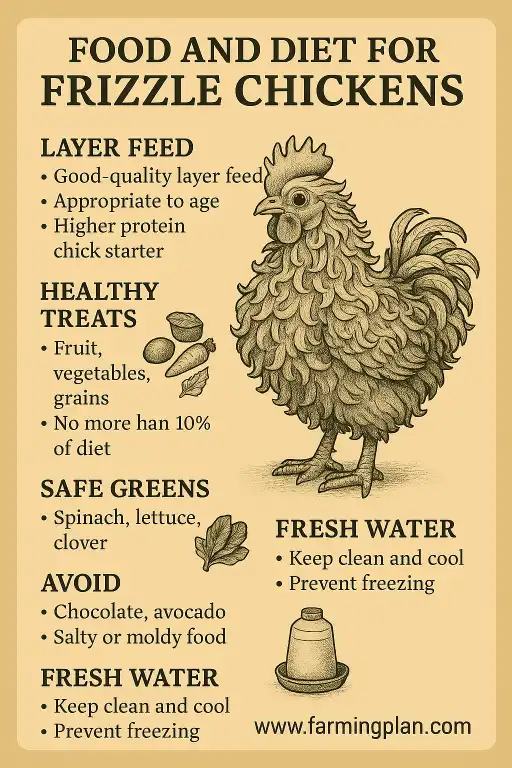
Feeding your Frizzle Chicken the right food is the key to good health and strong egg laying. These birds need a balanced diet to keep their frizzled feathers healthy and their bodies strong. Since they are fair egg layers, they also need enough protein and calcium to produce LOTS of eggs weekly. Start with a good-quality layer feed. This should make up most of their daily food. Choose a feed that’s made for your bird’s age. Baby chicks need chick starter feed with higher protein. Adult birds should eat layer feed with added calcium.
You can also give your Frizzles healthy treats. Try fruits, veggies, grains, and mealworms. Just don’t overdo it. Treats should be only 10% of their diet. Too many snacks can lead to chicken health problems like low egg production or weight gain.
Fresh greens from your yard or garden are a great choice. Spinach, lettuce, and clover are safe and fun to peck at. Avoid giving them foods like chocolate, avocado, salty snacks, or anything moldy. These can harm your chickens. Always provide clean, fresh water. Chickens drink a lot, especially in hot weather. Make sure the water doesn’t freeze in winter or get too dirty.
Due to selective breeding, frizzles may have softer beaks. So, using crumble or small pellet feed makes it easier for them to eat. Keep food dry and store it in a cool, safe place to prevent mold or bugs from getting in. A healthy Frizzle Chicken starts with smart feeding habits. Your birds will stay happy and energetic with good food and clean water.
Usage and Purpose of Frizzle Chickens
The Frizzle Chicken is more than just a pretty face. Many love these birds for their looks, personality, and usefulness. They fit in well with different owners, from pet chicken lovers to backyard chicken keepers and even poultry fanciers who enjoy showing birds at fairs.
Frizzles are often kept as family pets. Their gentle nature and fun appearance make them great around kids and first-time chicken owners. Many enjoy having them in a backyard flock to watch their wild curls and funny behavior. They’re also popular in schools and farms for giving kids an educational experience in chicken keeping. Though they’re not the best egg layers, Frizzle Chickens still give you many eggs. The eggs are usually light brown and perfect for home use. Families who want fresh eggs and friendly birds often choose this breed for both.
Some owners raise Frizzles for chicken exhibitions or chicken competitions. These birds follow a certain chicken breed standard and are often judged based on their feather curl, body shape, and personality. Varieties like the Frizzled Polish or Frizzled Cochin do exceptionally well at shows. Because of their small size and docile behavior, they’re not used for meat. Their primary purpose is beauty, fun, and light egg-laying. If you want a bird that adds color and joy to your coop, the Frizzle Chicken breed is perfect.
Special Features of the Frizzle Chicken
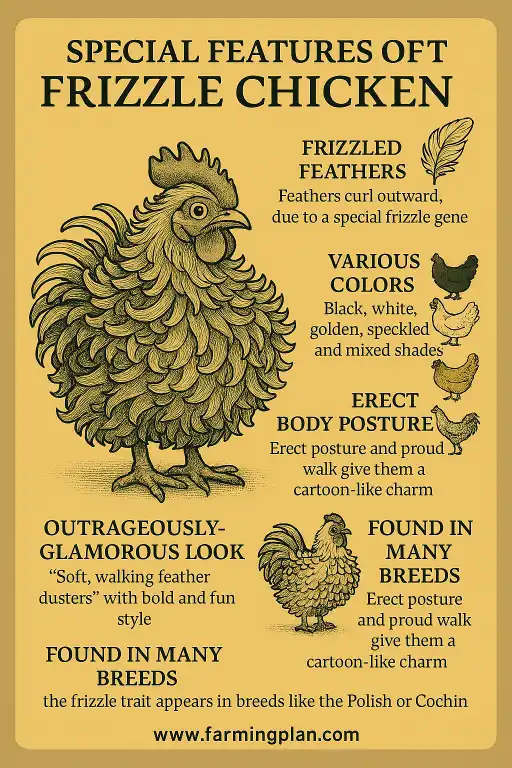
The Frizzle Chicken is famous for its wild, curly look. Its most special feature is its frizzled feathers, which twist and curl outward instead of lying flat. This is caused by a special frizzle gene, which makes the bird look like a soft, walking feather duster. Because of these curly feathers, the Frizzle has a striking appearance. Many call them “outrageously-glamorous birds” because of their bold and fun style. They look like they just stepped out of a windstorm, even on a calm day!
Frizzles can come in various colors, from black and white to golden and speckled. Some even have a mix of colors, adding to their unique beauty. Their feathers’ depth of color and shine make them stand out in any backyard chicken breed collection. Another remarkable trait is their body posture. Frizzles often have erect bodies and a proud walk. This, combined with their fluff, gives them a cartoon-like charm. That’s why some people even compare them to animatronic chickens or “dancing chickens.”
This feathering trait isn’t limited to just one breed. The Frizzle look can appear in many breeds, such as the Frizzled Polish or Cochin. However, not every frizzled bird is a true Frizzle Chicken breed—only those bred for the curl and personality.
The Frizzle Chicken brings it all if you want an exotic, fun-loving, and family-friendly bird. Their look is unique, and their presence always brings joy to the flock. Whether you’re a poultry enthusiast or a first-time chicken owner, raising a Frizzle can be a joyful experience. In this guide, you’ll learn everything about this breed—from its history and features to care tips, feeding advice, and how to keep your frizzle chickens happy and healthy. We’ll even walk you through a step-by-step care guide for raising baby chicks into beautiful adult birds. If you’ve ever dreamed of owning a feathered friend with fun and that’s flair, this bird might be the perfect fit for your flock.
Health Issues and Prevention in Frizzle Chickens
Like all chickens, the Frizzle Chicken needs care to stay healthy and happy. While its frizzled feathers may look fun, they can also make the bird more sensitive to certain problems. Knowing what to look for and how to prevent issues is the best way to protect your flock.
One of the most common health issues in Frizzles is feather breakage. Their curly feathers are softer and less strong than smooth feathers, so they can snap or wear down easily. This can leave the bird cold or stressed, especially in extreme cold. To prevent this, keep your chicken coop dry, clean, and warm. Give your birds shelter from wind and rain.
Frazzle chickens from two frizzled parents can suffer from severe internal issues and weak feathers. These birds often have poor feather coverage and health problems. That’s why breeding it’s one frizzled bird with a smooth-feathered bird is better. Watch out for leg mites, too. Frizzles, like many breeds, can get these tiny pests. If your chickens experience leg mites, you might see rough, scaly legs. Please treat it with gentle oils or sprays made for chickens, and always keep bedding fresh.
Make sure your birds have clean, fresh water and a balanced diet. A poor diet can lead to low energy, weak eggshells, and feather loss. Also, give your birds space to move and dust bathe. This helps keep feathers clean and stress levels low. Good chicken health starts with daily care, a clean living space, and regular checks. A happy Frizzle Chicken is easy to spot—it’s fluffy, active, and always ready to dance.
Step-by-Step Care Guide for Frizzle Chickens
Raising Frizzle Chickens is a rewarding experience, especially when you know how to care for them properly. Whether you’re a first-time chicken owner or a seasoned poultry keeper, this step-by-step guide will help ensure your Frizzles stay happy, healthy, and fluffy.
Setting Up the Chicken Coop
Before bringing your Frizzle Chicken home, have a chicken coop that suits their needs. Frizzles don’t like damp or cold conditions, so choose a well-ventilated but warm space. Add plenty of bedding (straw or wood shavings) to keep them comfortable and prevent health issues like mites.
Providing Space for Your Frizzles
Even though Frizzle Chickens are smaller, they still need room to roam. Make sure your backyard chickens have enough space to move around freely. Aim for at least 2-3 square feet per chicken inside the coop and more space for outdoor play.
Feeding Your Frizzles
Frizzles need a balanced diet to stay healthy and lay eggs. Start with a layer of feed that’s rich in calcium and protein. Make sure to offer fresh water daily. You can also provide small treats like fruits, vegetables, and mealworms, but keep treats to less than 10% of their diet.
Keeping Them Clean
Frizzle chickens’ curly feathers can trap dirt, so providing them a place to dust and bathe is essential. This helps keep their feathers clean and prevents pests like mites. Clean their coop regularly to keep them healthy and happy.
Regular Health Checks
Check your Frizzles for signs of illness or discomfort. Look for changes in behavior, such as loss of appetite or unusual lethargy. Inspect their feathers and legs for signs of mites or feather damage. Regular health checks will help you catch problems early and prevent them from becoming more significant.
Breeding and Hatching
If you want to breed Frizzles, remember that you should not mate two frizzled birds together, as this can result in frazzled chickens with weak feathers and health problems. Breed one frizzled bird with a smooth-feathered bird to ensure healthy offspring.
Providing Enrichment
Frizzles are social birds and enjoy interacting with their flock. Give them things like pecking at treats, scratching in the dirt, or exploring new areas. They’re curious creatures and love staying busy.
Managing Cold Weather
Frizzles are not as cold-hardy as other breeds. In freezing weather, ensure their coop is warm and drafts-free. Provide extra bedding and ensure they can always access fresh, unfrozen water.
Ensuring Safety from Predators
Like all chickens, Frizzles can be vulnerable to predators, so make sure your backyard chickens have a secure enclosure. Ensure the coop is predator-proof and that there are no gaps in the fencing where predators could get in.
Expert Tips & Best Practices for Frizzle Chickens
Raising Frizzle Chickens can be a joyful experience, but a few expert tips and best practices can help you make the most of your time with these beautiful birds. Whether you’re a poultry fancier, a backyard chicken keeper, or a family pet owner, these tips will help you keep your Frizzles healthy and happy.
Keep Their Coop Clean and Dry
Frizzle chickens are susceptible to wet and dirty conditions because their frizzled feathers don’t protect them like smooth feathers. Regularly clean your coop and change the bedding to keep the birds dry and comfortable. A clean, dry environment will also reduce the chances of pests like mites and lice.
Offer a Balanced Diet
Like all chickens, frizzles need a well-balanced diet to thrive. For strong eggshells, feed them high-quality layer feed rich in protein and calcium. Supplement with occasional treats like mealworms, fruits, and greens, but don’t overfeed them with snacks. This will prevent health issues and ensure they get all the necessary nutrients.
Monitor for Over-Frizzled Birds
While the frizzling gene makes Frizzles unique, too much can result in over-frizzled birds. These chickens may suffer from poor feathering, weakness, and even health problems. Mix a frizzled bird with a smooth-feathered bird when breeding Frizzles to avoid frazzled or weak offspring.
Keep Their Environment Stress-Free
Frizzle chickens are gentle and don’t do well in stressful environments. Please keep them in a calm, peaceful flock, away from aggressive birds. This will help them stay happy and avoid unwanted behavior issues. Providing them with a comfortable and stress-free living environment is one of the best practices for maintaining their health.
Consider Breeding for Exhibitions
If you’re interested in chicken competitions, Frizzle chickens are a standout breed. They’re often entered in shows because of their distinctive appearance and feathering type. When breeding for shows, focus on selecting Frizzles that follow the breed standard, especially for curled feathers and a proud body posture.
Be Prepared for Seasonal Challenges
While Frizzle Chickens are hardy in some conditions, they can struggle in extreme weather. During the colder months, ensure your birds have a warm, well-insulated coop. In hot weather, provide shade and always ensure fresh, clean water. This will help your Frizzles stay comfortable and avoid health issues related to temperature extremes.
Enjoy Their Quirky Personality
One of the best parts of owning a Frizzle is their fun, quirky personality. These birds love attention and enjoy being part of the family. Spend time with them daily, talk to them, and provide little treats. Their dancing chickens’ antics and striking appearance will make them a delightful addition to your backyard flock.
“Frizzle Chickens may not fly, but they’ll definitely steal your heart with their curly feathers and friendly personalities!”
FAQs
1. What is a Frizzle Chicken?
A Frizzle Chicken has naturally curled feathers due to a genetic mutation. This trait can appear in various breeds, including Cochins, Polish, and Japanese Bantams, but it is not a breed in the U.S.
2. Are Frizzle Chickens good pets?
Yes, Frizzle Chickens are known for their friendly and docile nature, making them excellent pets for families and beginners. They are calm, easy to handle, and enjoy human interaction.
3. How many eggs do Frizzle Chickens lay?
Frizzle hens typically lay around 2 to 3 eggs per week, totaling approximately 120 to 150 eggs annually. The eggs are usually white or cream-colored.
4. Can Frizzle Chickens fly?
No, Frizzle Chickens cannot fly well due to their curled feathers, which lack the aerodynamic structure of normal feathers. This makes them more grounded and less likely to escape enclosures.
5. What are common health issues in Frizzle Chickens?
Due to their unique feather structure, Frizzle Chickens can be prone to feather breakage and skin irritation. Regular grooming and a clean, dry environment can help prevent these issues.
Conclusion
Frizzle Chickens are a unique and charming addition to any flock, known for their curly feathers and friendly demeanor. While they may not be prolific egg layers, their docile nature and ease of care make them ideal pets for families and beginners. Their inability to fly and susceptibility to feather breakage requires attentive care, including regular grooming and a clean, dry environment. Whether kept for companionship, exhibition or as part of a backyard flock, Frizzle Chickens offer both beauty and personality, enriching the lives of their owners.

